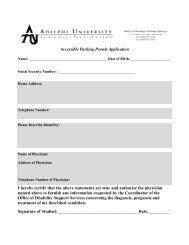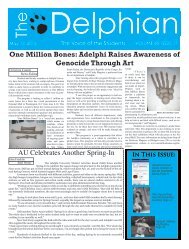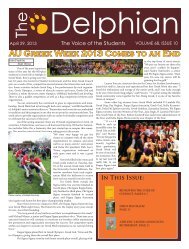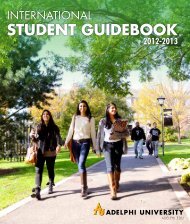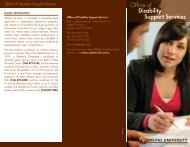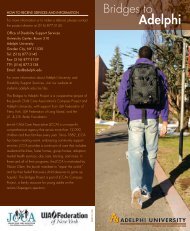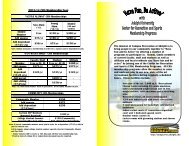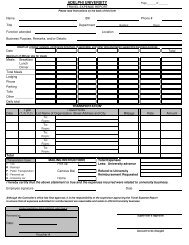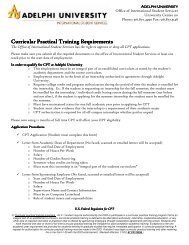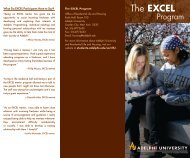Guide to Student Life - Campus Life - Adelphi University
Guide to Student Life - Campus Life - Adelphi University
Guide to Student Life - Campus Life - Adelphi University
Create successful ePaper yourself
Turn your PDF publications into a flip-book with our unique Google optimized e-Paper software.
93 Procedures <strong>to</strong> Handle Violations<br />
ADELPHI UNIVERSITY • GUIDE TO STUDENT LIFE<br />
The approach <strong>to</strong> handling reported violations is generally a progressive one. That is, the<br />
procedure is designed <strong>to</strong> allow options at various stages based on the severity of the charge<br />
or facts that emerge from the proceedings. Although the work will normally be done by<br />
the Committee as outlined here, the provost will have the authority <strong>to</strong> convene an ad hoc<br />
committee <strong>to</strong> handle charges when the matter is urgent and the standing committee is unable<br />
<strong>to</strong> meet. In such cases, the provost will seek as far as possible <strong>to</strong> secure both student and<br />
faculty representation on the ad hoc hearing committee.<br />
The detailed procedures outlined below are intended and envisioned primarily for undergraduate<br />
violations. Graduate students are held <strong>to</strong> a higher standard; they are typically older, more<br />
experienced, and often engaged in study in areas where human health and welfare could<br />
be seriously affected by academic dishonesty. Graduate violations should be reported (by<br />
professors or students) <strong>to</strong> the dean. The student’s dean will have the power <strong>to</strong> set a penalty,<br />
including immediate expulsion from the program (and therefore from the <strong>University</strong>). If the<br />
graduate student contests the facts, he or she may ask for a hearing with the Committee. If the<br />
Committee upholds the violation, the Committee will impose the penalty recommended by the<br />
dean. Graduate students will be clearly and formally informed of this policy and the severity of<br />
violations of the Code of Academic Honesty upon enrollment.<br />
Any student who observes or suspects a violation is encouraged <strong>to</strong> report the violation <strong>to</strong> the<br />
appropriate professor, any member of the Committee, or the Office of the Provost, which will<br />
forward the charge <strong>to</strong> the Committee. A professor who observes or suspects a violation may wish<br />
<strong>to</strong> begin by talking with the accused student(s). As has always been the case, professors have<br />
the right and power <strong>to</strong> adjust grades on the basis of academic dishonesty; however, whether<br />
or not the professor and student agree on the facts or the grade, either may choose <strong>to</strong> go <strong>to</strong><br />
the Committee. Note: Professors are required <strong>to</strong> report directly <strong>to</strong> the Office of the Provost all<br />
instances of academic dishonesty. This particularly includes those cases in which the student and<br />
professor resolve the matter without requesting any action from the Committee. Even though a<br />
case of admitted dishonesty may be resolved by stern admonition and/or an agreed-on penalty<br />
in the form of a grade, a record must be kept so that the professor and the provost can know<br />
whether or not the student has any his<strong>to</strong>ry of academic dishonesty. <strong>Student</strong>s who wish <strong>to</strong> contest<br />
the claims against them or the decision of the Office of the Provost may request a hearing with<br />
the hearing board.<br />
When the Committee receives notification of a suspected violation, the chair will appoint one<br />
of the 12 faculty members serving <strong>to</strong> undertake the role of media<strong>to</strong>r and/or fact finder. The fact<br />
finder will begin the investigation as expeditiously as possible, but whenever possible, no later<br />
than a week after receiving the charge.<br />
The appointed professor will first check <strong>to</strong> see if the accused student has any recorded<br />
violations in the records of the Committee maintained in the Office of the Provost. If the<br />
student has no record of reported violations, the investiga<strong>to</strong>r will approach the accused student<br />
and the person(s) who has suspected the student and begin the investigation, hoping <strong>to</strong> find<br />
grounds for mediation. If upon investigation it emerges that there are no prior violations and<br />
the offense is not egregious, the investiga<strong>to</strong>r may attempt <strong>to</strong> see if all parties can be brought<br />
in<strong>to</strong> agreement about the facts of the situation and if a solution can be found that would not<br />
require the involvement of a hearing board. If no such solution can be reached, a hearing will<br />
be required, and the professor will proceed <strong>to</strong> gather facts from all parties concerned. Likewise,<br />
if the accused student has any recorded violations, a hearing will be required and the fact<br />
finder will begin the investigation, preparing the case for a hearing. When the investigation is




